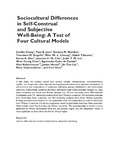Sociocultural differences in self-construal and subjective wellbeing: a test of four cultural modelsl

View/
Date
2011-07Author
Cheng, C.
Jose, P.E.
Sheldon, K.M.
Singelis, T.M.
Cheung, M.W.L.
Tiliouine, H.
Alao, A.A.
Chio, J.H.M.
Lui, J.Y.M.
Chun, W.Y.
De Zavala, A.G.
Hukuzimana, A.
Hertel, J.
Liu, J.T.
Onyewadume, M.
Sims, C.
Publisher
JCCP, http://jcc.sagepub.comType
Published ArticleMetadata
Show full item recordAbstract
In this study, the authors tested four cultural models—independence, interdependence, conflict, and integration—that describe the hypothesized relationships between dimensions of self-construal and components of subjective well-being among individualistic and collectivistic countries. Collectivistic countries that have undergone rapid socioeconomic changes (i.e., East Asian countries) and those with limited changes (i.e., African countries) were differentiated. Participants were 791 university students from four Western countries, 749 university students from three East Asian countries, and 443 university students from three African countries. Findings provided some support for the applicability of (a) the independence model to individuals from Western countries and (b) the integration model to individuals from East Asian countries. Mixed results were found among the African countries. The interdependence model is more applicable to African participants from the sub-Saharan region, but the integration model is more applicable to those from the North African region.
